- Facebook Icon
- Twitter Icon

Star Trek Gave Us a Utopian Vision of an Egalitarian, Postcapitalist Future
- Back Issues
“Town & Country,” our summer issue, is out soon. Subscribe to our print edition today.
Unlike many classic works of sci-fi, Star Trek offered an optimistic vision of humanity’s future — one where democracy triumphs, exploitation is ended, and everyone’s material needs are met.

Still from Star Trek: The Next Generation . (Paramount Domestic Television, 1993)
It’s the year 2364 and a tatty old space shuttle containing former Wall Street capitalist Ralph Offenhouse, who was cryogenically frozen in 1994, has just been discovered floating through space by a starship called the Enterprise–D. Upon waking, Offenhouse discovers that, although science has found a cure for his previously terminal illness, his bank accounts and investments have all gone. To his horror, not even his beloved Wall Street Journal has survived the ravages of time.
“A lot has changed in the past three hundred years,” the ship’s captain Jean-Luc Picard tells him. “People are no longer obsessed with the accumulation of things. We’ve eliminated hunger, want, the need for possessions. We’ve grown out of our infancy.”
It’s particularly striking that in a genre that trends toward bleak, dystopian futures, Star Trek is an outlier in science fiction for offering an optimistic vision for humanity’s future. In fact, while it may be overly simplistic to say that Star Trek depicts a socialist society, its utopianism owes much to the ideas of Marx in that it imagines a future where collectivism triumphs, money is obsolete, and every material need is met.
Beyond Capitalism
The show follows, in various incarnations, a spaceship and its crew whose enduring mission is to “boldly go where no one has gone before.” But as Captain Picard explains in First Contact (1996), “The acquisition of wealth is no longer the driving force in our lives. We work to better ourselves and the rest of humanity.”
Instead of working just to live, humans are free to spend their time exploring the cosmos, or inventing, or making art — and sometimes doing all three. This optimistic view of human nature is in stark contrast to films such as Pixar’s Wall-E , which follows the right-wing line of thinking that achieving a postscarcity society (what Keynes calls the “economic problem”) would lead to sloth and hedonism, and ultimately the demise of humanity.
In Star Trek, geopolitics is a thing of the past. Instead, there’s the United Federation of Planets, a United Nations–inspired organization founded on the principles of liberty, equality, justice, progress, and peaceful coexistence, which is dedicated to the pursuit of knowledge and the universal enfranchisement of sentient life. It is a world in which economic conditions allow each person to contribute to society according to their ability and consume according to their needs.
It’s worth noting here that Star Trek is a product of a political era that preceded post-Fordist, neoliberal conditions, when different futures were not only imagined but contested. Star Trek: The Original Series aired between 1966 and 1969 — a fertile period for the political imagination in spite of great unrest.
Gene Roddenberry, Star Trek’s creator, certainly subscribed to this optimism. He believed that humanity, rather than being doomed to self-destruct, was destined to evolve out of our political myopia. It was thanks to Roddenberry that The Original Series , though dated by today’s standards, was ahead of its time with its multinational, multiethnic, and multigender crew. Famously, the show featured the first-ever televised interracial kiss (in an episode banned by the BBC ), and Martin Luther King once said that Star Trek was “the only show I and my wife Coretta will allow our three little children to stay up and watch.”
Today, Roddenberry’s flaws and hypocrisies are well documented. According to his last wife, Majel Barrett, he identified as a communist. But we know from the many accounts of his unethical business practices that he was also obsessed with making money. He preached peace and love but was infamously difficult to get along with. And he flew the flag for feminism while being a notorious womanizer.
Rather than focus on Roddenberry the man, I find it more interesting to evaluate Roddenberry the salesman. When the show aired, there was widespread unrest; the United States was being torn apart by race riots and antiwar protests; and the then–very new and horrifying threat of nuclear Armageddon loomed large on the horizon. But rather than offer an “extrapolation or exacerbation” of these conditions, as culture is prone to do, Roddenberry saw the appeal of a brighter future.
Perhaps he recognized this appeal because he knew better than most how awful humans could be.
The Politics of Technology
When the show was rebooted in the 1980s, the political horizon was narrowing. Yet it was in this decade, just two years before the fall of the Berlin Wall, that Star Trek became most notably Marxian. This was all thanks to the introduction of the “replicator,” a futuristic 3D printer that can create anything out of recycled matter, thus solving the problem of scarcity. So far, so science fiction.
But in Star Trek, technology alone doesn’t bring about utopia. As we learn through the introduction of the Ferengi — an alien race whose culture centers around greed and profiteering — the socialization of the replicator is a political choice. The Ferengi’s replicators are privatized, whereas replicators in the Federation are publicly owned.
While concepts such as warp-speed propulsion and teleportation remain firmly in the realm of science fiction, many of Star Trek’s technological predictions have materialized or are coming to pass — including the concept of 3D printing at the molecular level and the increasingly exploitative applications of artificial intelligence. What capitalism renders unthinkable is the politics behind technology: that developments in technology might benefit us rather than usher in further alienation.
Star Trek provides an antithesis to how capitalism predisposes us to view technology, allowing us to imagine what society might look like if technology were used purely for improving our quality of life. Instead of following this path, the morsels of convenience we’ve received through technological advancements are only enough to numb us to the realization that we’ve become locked into a cycle of consumerism and surveillance capitalism.
Constructing Utopia
Another utopian aspect of Star Trek is its depiction of solidarity. Roddenberry had many “rules” that he insisted upon the show following, but his most infamous is what’s become known as “Roddenberry’s principle”: a mandate that conflict must never be between the main characters, only with external forces.
Roddenberry’s argument was that, for the utopian conditions of Star Trek to be believable, the characters must represent the best of humanity. In the episode “Remember Me,” the ship’s doctor Beverly Crusher notes that crewmembers are disappearing. But each time a person disappears, they become forgotten by everyone else; to the rest of the crew, they never existed.
In a typical drama, this would be what’s called a “Cassandra Truth” plotline: the hero discovers a conspiracy, nobody else believes them, and so the hero has no choice but to solve the mystery alone. But in Star Trek , rather than treat the doctor as though she has lost her mind, the possibility that people are being erased from existence is taken seriously and investigated by her colleagues.
Instead of the show’s drama revolving around interpersonal conflict, problems are overcome through teamwork, and very rarely as the result of one person’s heroism. It’s one of the most unique aspects of the show; as viewers, we’ve come to expect conflict between characters to be one of the most fundamental aspects of drama.
There’s comfort in knowing that no matter the scale of the problem, you can trust the characters to communicate their thoughts and feelings, weigh the situation objectively, and work together. But more than comfort, Star Trek continuously offers examples of cooperation, conflict resolution, kindness, and empathy that are in short supply in most modern dramas.
To me, this is perhaps the most radical element of Star Trek . In simply showing the possibilities of cooperation, the show offers something for us to all strive toward — and solidarity is no doubt the first building block required for constructing utopia.
Sci-Fi Optimism
When the time comes for the twentieth-century capitalist Ralph Offenhouse to return to twenty-fourth-century Earth, he’s at a loss. “What will I do? How will I live?” he asks; “ What’s the challenge? ” The problem is, Offenhouse has never allowed himself to imagine an alternative to capitalism. And to someone that has lived his whole life in a prison, there is nothing more daunting than being set free. Like the prisoner in Plato’s cave, the instinct is to return to the darkness that he’s accustomed to.
In a sense, we are all Offenhouse. We might not all suffer from his peculiar strain of capitalist Stockholm syndrome, but we all, naturally, struggle to imagine an alternative way of living. We all live under the same political system that snuffs out any threats to its existence by design, and it becomes harder to imagine an alternative each day that this system entrenches itself deeper into our lives.
Here lies the power of Star Trek . It’s easy to dismiss utopian science-fiction as escapist, as though capitalist escapism is a lower form of art than realism, but what good does the constant reminder that everything is bad do for society? Negativity is hardly inspiring. And besides, as Gene Roddenberry recognized (politicians take note), optimism sells.
- Share full article
Advertisement
Supported by
Red Century
‘Make It So’: ‘Star Trek’ and Its Debt to Revolutionary Socialism
By A.M. Gittlitz
- July 24, 2017

H. G. Wells’s foundational work of political science fiction, “The Time Machine,” predicted a future in which a small utopia of sprightly elites is kept running by a subclass that lives below the ground and is reduced to bestial violence. This prediction, carried to a horrifically logical extent, represented the intense wealth disparity of the Victorian England in which Wells wrote the novel. Judging from the major political narratives of the fictions of our era, films like “The Hunger Games,” “Elysium” and “Snowpiercer,” the certainty of a future rendered increasingly barbarous by class division remains essentially the same.
But this was not always the case. In 1920, Wells met Vladimir Lenin, a fellow world-building visionary who planned “the inauguration of an age of limitless experiment” to rebuild and industrialize his country from ruination by years of war, abolishing class society in the process. Wells was impressed by the pragmatic revolutionary and his planned “utopia of electricians.”
If Wells had been less skeptical of Communism and joined the party, he wouldn’t have been the first sci-fi or futurist thinker to do so. Alexander Bogdanov, an early political rival of Lenin’s, wrote “Red Star,” a utopian novel about a Communist colony on Mars where everything was held in common and life spans were greatly extended through the use of parabiosis, the mutual sharing of blood. Along with Anatoly Lunacharsky and Maxim Gorky, Bogdanov proposed a program of “God Building,” which would replace the rituals and myths of the Orthodox Church through creation of an atheistic religion.
For his part, Gorky was a fan of the Cosmism of Nikolai Fyodorov and Konstantin Tsiolkovsky, a scientific and mystical philosophy proposing space exploration and human immortality. When Lenin died four years after meeting with Wells, the futurist poet Vladimir Mayakovsky’s line “Lenin Lived, Lenin Lives, Lenin Will Live Forever!” became not only a state slogan, but also a scientific goal. These Biocosmist-Immortalists, as they were known, believed that socialist scientists, freed from the constraints of the capitalist profit motive, would discover how to abolish death and bring back their comrades. Lenin’s corpse remains preserved for the occasion.
Bogdanov died in the course of his blood-sharing experiments, and other futurist dreams were sidelined by the industrial and militarist priorities that led up to World War II. In the postwar period, however, scientists inspired by Cosmism launched Sputnik. The satellite’s faint blinking in the night sky signaled an era of immense human potential to escape all limitations natural and political, with the equal probability of destroying everything in a matter of hours.
Feeding on this tension, science fiction and futurism entered their “golden age” by the 1950s and ’60s, both predicting the bright future that would replace the Cold War. Technological advances would automate society; the necessity of work would fade away. Industrial wealth would be distributed as a universal basic income, and an age of leisure and vitality would follow. Humans would continue to voyage into space, creating off-Earth colonies and perhaps making new, extraterrestrial friends in the process. In a rare 1966 collaboration across the Iron Curtain, the astronomer Carl Sagan co-wrote “Intelligent Life in the Universe” with Iosif Shklovosky. This work of astrobiological optimism proposed that humans attempt to contact their galactic neighbors.
Interest in alien life was not just the domain of scientists and fiction writers. U.F.O. flaps worldwide captured pop cultural attention, and many believed that flying saucers were here to warn us, or even save us, from the danger of nuclear weapons. In the midst of the worldwide worker and student uprisings in 1968, the Argentine Trotskyist leader known as J. Posadas wrote an essay proposing solidarity between the working class and the alien visitors. He argued that their technological advancement indicated they would be socialists and could deliver us the technology to free Earth from the grip of Yankee imperialism and the bureaucratic workers’ states.
Such views were less fringe and more influential than you might think. Beginning in 1966, the plot of “Star Trek” closely followed Posadas’s propositions. After a nuclear third world war (which Posadas also believed would lead to socialist revolution), Vulcan aliens visit Earth, welcoming them into a galactic federation and delivering replicator technology that would abolish scarcity. Humans soon unify as a species, formally abolishing money and all hierarchies of race, gender and class.
“A lot has changed in the past 300 years,” Captain Picard explains to a cryogenically unfrozen businessman from the 20th century in an episode of a later “Star Trek” franchise, “The Next Generation.” “People are no longer obsessed with the accumulation of things. We’ve eliminated hunger, want, the need for possessions. We’ve grown out of our infancy.”
For all its continued popularity, such optimism was unusual in the genre. The new wave of sci-fi in the late ’60s, typified by J. G. Ballard and Philip K. Dick in the United States and by the Strugatsky brothers and Stanislaw Lem in the East, presented narratives that undercut this theme of humans’ saving themselves through their own rationality.
The grand proposals of the ’60s futurists also faded away, as the Fordist period of postwar economic growth abruptly about-faced. Instead of automation and guaranteed income, workers got austerity and deregulation. The Marxist theorist Franco Berardi described this period as one in which an inherent optimism for the future, implied by socialism and progressivism, faded into the “no future” nihilism of neoliberalism and Thatcherite economics, which insisted that “there is no alternative.”
The fall of the Soviet Union cemented this “end of history,” in Francis Fukuyama’s phrase, and signaled a return to late-capitalist dystopian narratives of the future, like that of “The Time Machine.” Two of the most popular sci-fi films of the ’90s were “Terminator 2” and “The Matrix,” which both showcased a world in which capital had triumphed and its machinery would not liberate mankind, but govern it. The recent success of “The Road,” “The Handmaid’s Tale” and “The Walking Dead” similarly predict violent futures where only small underground resistance movements struggle to keep the dying flame of humanity alight.
Released the same year as “Star Trek: First Contact” — and grossing three times as much — “Independence Day” told a story directly opposed to Posadism, in which those who gather to greet the aliens and protest military engagement with them are the first to be incinerated by the extraterrestrials’ directed-energy weapons. (In Wells’s 1897 vision of alien invasion, “The War of the Worlds,” the white flag-waving welcoming party of humans is similarly dispatched.)
The grotesque work of 1970s white supremacist speculative fiction, “The Camp of the Saints” by Jean Raspail — recently referenced by the White House strategist Steve Bannon — has a similar story line. A fleet of refugee ships appears off the coast of France, asking for safe harbor, but it soon becomes apparent that the ship is a Trojan horse. Its admission triggers an invasion of Europe and the United States.
The recent rise of right-wing populism indicates a widening crack in the neoliberal consensus of ideological centrism. From this breach, past visions of the future are once again pouring out. Peter Thiel, Elon Musk and Mark Zuckerberg feel empowered to propose science fiction premises, like space colonization and post-scarcity economics, as solutions to actual social problems. Absent, however, are the mass social movements of the 20th century calling for the democratization of social wealth and politics. While rapid changes in the social order that are the dream of Silicon Valley’s disruptors are acquiring an aura of inevitability, a world absent of intense poverty and bigoted hostility feels unimaginable.
Shortly after World War II, Wells became so convinced of humanity’s doom, without a world revolution, that he revised the last chapter of “A Short History of the World” to include the extinction of mankind. Today we are left with a similar fatalism, allowing the eliminiationist suggestions of the far right to argue, in effect, for a walling-off of the world along lines of class, nationality and race, even if this might condemn millions to death.
If humanity in the 21st century is to be rescued from its tailspin descent into the abyss, we must recall the choice offered by the alien visitor from the 1951 sci-fi film classic “The Day the Earth Stood Still.”
“Join us and live in peace,” Klaatu said, “or pursue your present course and face obliteration.”
I think of it as science fiction’s useful paraphrasing of Rosa Luxemburg’s revolutionary ultimatum: “socialism or barbarism.”
A. M. Gittlitz is a writer from Brooklyn who specializes in counterculture and radical politics.
This is an essay in the series Red Century, about the history and legacy of Communism 100 years after the Russian Revolution.
Follow The New York Times Opinion section on Facebook and Twitter (@NYTopinion) , and sign up for the Opinion Today newsletter .

The Political Philosophy of Star Trek
Individualism, not socialism.
Star Trek sometimes catches flack for portraying a Socialist space utopia. There's a vast, far-reaching central government, and Captain Picard often waxes – especially when time travel gives him the opportunity to lecture present-day people – about how humanity has evolved beyond self interest. Those interested in personal gain are portrayed in a less than flattering light . Our era with hundreds of national governments is reflected on smugly as "the age of confusion". But should Star Trek be totally thrown out for its political philosophy? I believe there's more to redeem it than to condemn it.
The economics of Star Trek, given the technology, are not so far-fetched. Replicator technology would enable the utopia of the Star Trek universe by eliminating physical scarcity of most things. Even energy scarcity isn't something one has to worry about except in extreme circumstances, thanks to antimatter-powered warp cores.
Granted, this point is (so far as I'm aware) never emphasized. But if marginal costs fall sufficiently across the board, the entire price system could plausibly become more costly than its benefits. Harold Demsetz argues near the end of his paper, " The Exchange and Enforcement of Property Rights ":
Attention is sometimes called to the fact that emerging technical developments will make the use of markets or governments more economic than they now are. There are surely many instances where this is true. However, our analysis suggests that technological developments can operate in the opposite direction. . . . Markets or their government alternatives should come into greater prominence only if technical developments lower the costs of these institutional arrangements more than they reduce the costs of producing[.]
Replicators and warp cores clearly reduce raw costs of production more than they reduce the costs of government or the market mechanism. One could imagine a story where after hundreds of years, the question of allocation by the price mechanism becomes outmoded, and the economics of scarcity fall into disuse.
Nevertheless, despite the negative portrayal of capitalists, there is a more fundamental theme: individualism. Though Starfleet might fairly be called a Socialist utopia, it is not always a perfect one. One of the most common themes in each of the series is the captain's deliberate defiance of a direct order, thereby saving the day. Successwise, captains have a vastly better track record than Starfleet, illustrating well the knowledge problem of centralized government. Naturally, though Starfleet never does back off the regulations and directives, it's apparently fine to violate them so long as things work out in the end.
Star Trek is in fact rather schizophrenic in its attitude towards its utopia. Generally it's good and enlightened, though often misinformed, having to be corrected by intrepid Enterprise captains. Occasionally though, Starfleet embodies every problem of tyrannical government, making the captains not only occasional rulebreakers with exceptionally good judgement, but outright traitor-heroes. The story of Insurrection , for example, puts Starfleet barely short of genocide, forcibly relocating an eternally youthful race to another planet where they would eventually die. The crew of the Enterprise, infected with the planet's youthful vigor, reneges against Starfleet and saves the Ba'ku. And there is never a bit of moral ambiguity in their decision.
These themes come to the forefront in Voyager, where the crew has to make its way without the benefit – or the burden – of a nearby Starfleet. If Picard's driving ideology is altruism, Janeway's is explicit individualism. How many times throughout the Seven of Nine rehabilitation subplot did Janeway lecture Seven on the virtues of individuality? She's even been known to directly lecture the Borg Collective on the evils of collective consciousness. She called them a race "as close to pure evil as any race we've ever encountered," referring unambiguously to the forcible and imperial suppression of individuality.
So Star Trek promotes a Socialist utopia with a strongly individualist culture? Star Trek has always had a moralizing component to it. Though their stereotype of Capitalists could be called unfair, their utopia doesn't necessarily do injustice to economics, thanks to the replicator. So despite a political structure that would translate disastrously into our present world, the strong individualist themes of the show commend it far past its unfair stereotypes condemn it.
16 Comments
David Pontoppidan
I like this. However, you must remember that both trade and private property exist in the Star Trek universe and within the Federation, although in post-capitalistic ways of transaction and commerce. Star Trek is therefore not socialist by traditional definitions. I prefer to think of it as somewhat anarchistic.
But as a fellow friend of ours would say, it is only logical to assume that market-based systems would evolve and change drastically as technology improved the ways in which we live.
Above all else, Star Trek is about what it means to be human, and about moral questions. I was reminded of that tonight watching ‘Generations’, where Kirk gives up Paradise and provides the ultimate sacrifice to “make a difference”.
Some people do not understand, and they keep saying that they are socialists but in fact they are cumunitarians (no comunist too).
Joseph Sileo
It could be argued that scarcity wasn’t eliminated but transferred. For example it takes a great deal of energy to operate a replicator. It is shown in Voyager that resources were rationed because they were far away from their normal source of energy. A Market Economy immediately formed both aboard the ship,where crew members would use Holodeck time, replicator rations, and work details as currency, and between Voyager and other civilizations, where technology and other resources were traded. ST: Voyager is actually a great example of the natural emergence of a market economy. The reason the other series appeared to be Socialist Utopias was because matter was in infinite supply because they had the technology to convert energy into matter. The technology was also present to harness huge quantities of energy with little effort. (matter antimatter reactions)
Eventually as with all systems you get diminishing returns, so I would imagine with time scarcity would rear its ugly head. But who knows, technology could progress to the point where we can capture all forms of energy and all forms of matter, and convert the two. At that point wouldn’t we have a perpetual motion system?
Star Trek looks like a grand future to many people in the same way that the Soviet Union might have looked like a grand future to a starving medieval peasant. But relative to the potential and opportunity available within the Star Trek universe, there is clearly a lot of scarcity. What scarcity you ask? Materially, desires just shift: personal spacecraft instead of cars, grand estates instead of suburban homes, transporter travel vs high speed rail. And other kinds of scarcity are intrinsic and analogous to today: power and top jobs in science, exploration, management, politics.scientific research, opportunities for exploration, etc. are all still scarce. Scarcity never disappears. And the way those resources are allocated is typically socialist: through a bureaucracy, connections, and political influence.
And Star Trek allocates those in a typically socialist fashion: inefficiently, using a vast bureaucracy, uninformed centralized decision making, and based on power, status, and connections.
Yes, Star Trek is socialist, and it isn’t even a utopia.
Alexander Duncan
I think the problem you attribute to Star Trek is really a problem that you have invented yourself, i.e., the typification of Star Trek as “socialist.” If anything, Star Trek is technocratic, and technocracy is neither socialist nor capitalist – it represents thinking of another order altogether. Thus, of course there are elements of altruism and individualism in Star Trek, just as there are in human life. It has nothing to do with socialist political ideology at all.
Cameron Harwick
I tend to agree with you that that’s not the question it’s asking. But, rightly or wrongly, people really do think of it that way. E.g. http://www.volokh.com/posts/1241844798.shtml (negatively) http://www.myleftwing.com/showDiary.do?diaryId=354 (positively)
Jim Osborne
Star Trek portrays a Socialist decentralized management model WHICH would allow more individuality and choices regarding career and education. That also allows for a smaller government which reduces gridlock (look at the us congress) and by getting rid of personal wealth resources are redistributed so that everyone has at least their basic needs and medical and education met. You confuse propaganda of the USSR and our own ideology from the cold war, when you eliminate poverty, a lot of things would go with it: hopelessness, and dispair, cuelty, and exploitation. Marx envisioned a workers revolution occurring in an already industrialized country due to extreme disparity of wages, and lack of benefits compared with management
The former ceo of Exxon got a 450 million retirement package while they managed to wriggle out of fiscal responsibility caused by the Exxon Valdez and damage continues today and the citizens of Alaska ended up being shafted. People’s wages since 1980 have barely managed to stave off inflation while upper management reaps huge payouts. With the death of unions goes fair wages and health benefits and even retirement wait til you see all the fees for managing your 401k
Socialist, yes, but they get rid of the social problems we’ve ignored for the last 237 years. And replication technology in their universe occurred sometime after 2269. (I checked)
Creating things out of thin air instantly is nothing more than science fiction magical that uses an idiotic ideology (Communism or Socialist) that history has shown time and time again doesn’t work.
Why Star Trek’s Future Without Money Is Bogus http://brainknowsbetter.com/news/2013/4/17/why-star-treks-future-without-money-is-bogus
Joshua Scott Hotchkin
I have written about this in the past. Non-scarcity and reputation economies will change the entire landscape of human civilization. http://www.unicornworld.org/86/star-trek-is-not-a-socialist-utopia/
Why does every discussion about star trek say there isn’t a monetary system. Capitalism is alive and well only with fine tuned guidelines on ethics that ensure entry into the market over that of wealth protection. Strong ethical guidelines with a monetary system, drive isn’t based on amount of items owned and instead quality of life, a lack of consumerism that is exchanged for personal mental fulfillment. Honestly the idea is that of how the united States founding documents came into being. Taking all forms of past government and political party ideologies extracting the good, discarding the failures, and evolving to something better. It has a thriving economy that is balanced. There are multiple fos of currency and trade between planetary systems and species.
James T Kirk
Just remember the needs of the many outweigh the few Gold Rush se08 e03
Robert Hutchison
Whether Star Trek is socialist or communistic or whatever, I leave up to people who are a lot smarter and knowledgeable than me. I only know I LIKE IT! Live Long and Prosper, Everyone…
FearOfStupidity
I’ve dreamed of a society where you could choose what you want to do without concern of the basic human needs: food, shelter, clothing. Where you know every person on the planet has that as well. Where instead of choosing what you need to do now to survive after 65, you choose your passions, you live your WHOLE life now instead of waiting to retire.
This doesn’t have to mean people can’t choose to be loaded, but the system of capitalism without wealth gap rules is a system of oppression in itself. You want to give out $30 million CEO bonuses? Then you must put $300 milion back into the company with staff bonuses, better health coverage, etc.
The need for a world currency of equal value. Markets are driven by profits instead of humanity. We will ship raw materials great distances to be manufactured and then shipped back over those distances again to increase profits for us, the shareholders. We the shareholders, putting all our money into stocks for our retirement.
Along with the racism, xenophobia, misogyny, religious extremism… it’s sad, it’s depressing, our humanity is so far from a way better deal then the greed of now.
When referring to the Insurrection events, you seem to blame the Federation and Starfleet for actions short of genocide, but fail to mention that Admiral Dougherty, who was in charge of the relocation, withheld relevant facts, such as Dougherty’s alliance with the Son’A, his plan of a forceful relocation of the Ba’Ku and rendering the planet irrevokably uninhabitable by collecting the metaphasic particles. If he would have been honest with the consequences and factors of the operation, Starfleet would never condone it, meaning they’re not the bad guys you set them out to be.
Michael Mallalieu
personally I think star trek is based on the idea of mutual cooperation for the benefit of all, whether that is brought about by socialist/communist ideologies or by a neo capitalist system whatever that is; I don’t know. But what I do know is that for the federation to have come into being in the first place that it took a great third or fourth world war of selfishly competing nations for resources and the invention of a weapon of mass destruction which could travel faster than anything else before (warp drive) that Vulcans in the nearby vicinity enacted first contact and thus brought about the beginnings of a dialogue between ourselves and the Vulcans and witnessing another way of life and a more utilitarian if you like way of doing things. This dialogue or trade of ideas between ourselves and the Vulcans was the catalyst to our envisioning of a a brighter future among the stars with help and friendship of the Vulcans (live long and prosper). So we put our petty differences away and realised the common good of all and joined the federation, as the federation was not a human construct it had been in place for god knows how long before and each emerging civilisation once the basic technological recommendations have been met ie warp drive, contact is initiated. Nowhere as far as I’m aware does star trek say what earths political/economic system is like only that earth is a member of the federation, my inkling is that as all systems had failed in the past on earth and with dialogue with the Vulcans we realised we need to pull together for the common good which at the time was the future of the human race and more importantly the future of spaceship earth and so we created a similar system to how I see how the federation works, maybe one were we have a system similar to a Federal United Nations here on earth. Which I think would be (FUN)
normand calvé
Before politics or economics, the first aspect to adress is morality, like, is the economy at the service of a a minority’s intere$ts, or to satisfy at the welfare and prosperity of the majority of the citizens ?
Leave a Reply
More content, articles similar to this one.

Intellectual Property and Institutional Efficiency: The Limits of the Demsetz Story
Harold Demsetz (1967) in his classic paper “Toward a Theory of Property Rights” makes the case that property rights arise endogenously when the cost of the commons problem begins to exceed the cost of exclusion, and illustrates with the case of Native American tribes and land rights. Once buffalo become . . .

Political Philosophy Is About Norms, Not Freedom
A few years back there was a debate about “thick” versus “thin” libertarianism. The question was, should libertarians be concerned only with coercive restrictions on freedom, particularly from the state, or with softer, subtler, and more organic forms of social pressure as well? At this point the “thin” position was . . .

Economics Is Not About Policy
Imagine if the field we call microeconomics were actually devoted to giving business advice to Microsoft. Dozens of journals are devoted to telling Microsoft the best way to make a profit. There would be papers at conferences about the optimal price of an Xbox; papers about a market niche that . . .

Star Trek communism? New book charts possible futures
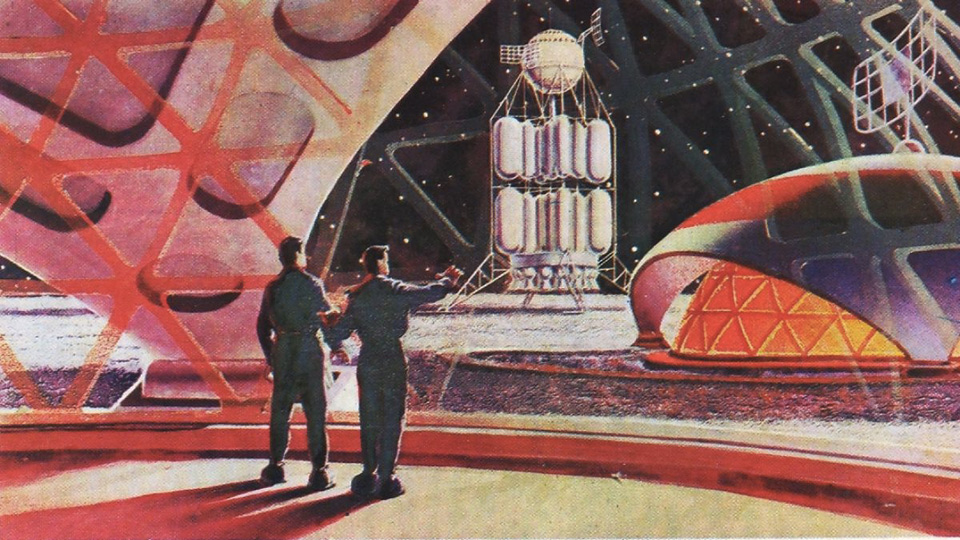
According to Peter Frase, the historical fork in the road facing humanity is not the two-pronged life-or-death choice of “ socialism or barbarism ” declared by Rosa Luxemburg a century ago. It’s more of a four-lane superhighway.
Frase’s short and very readable Four Futures: Life After Capitalism includes the two routes identified by Luxemburg and throws in two more – communism, of the post-scarcity, non-statist variety, and “rentism.”
This idea of multiple futures, none of which are inevitable, takes a quantum leap away from traditional historical materialism toward a kind of science-fiction Marxism. But Frase is no Slavoj Žižek – this is not just an exercise in psyochoanalytical Lacanian virtuosity.
Frase is an editor of the socialist magazine Jacobin , which has become an essential platform for debate about the advance of left politics in the U.S.
But where Jacobin gets down to the nitty-gritty of current labor and political battles, Four Futures takes a lighter, more speculative approach to how society may evolve in the wake of intensified class struggles and ecological crises.
The author uses the ideas of speculative and future fiction to explore how society could develop beyond capitalism. To do that he first dismantles the current technological determinism that seems to be in vogue among our tech-smart soothsayers who gleefully tell us the future belongs to the robots.
According to this unsettling narrative, automation will make many current jobs obsolete, leaving millions facing an insecure future in which we fight for scraps of work from the tech billionaires’ table while waiting to be turned into post-human waste tissue by our robot overlords.
While Frase does not dismiss these fears, since the risks are real, he questions the underlying premise that automation has to be a threat rather than part of a more socially balanced future. The missing element in mainstream analysis is, he points out, property relations and class struggle.
Frase contrasts this reality of 21st-century capitalist drudgery with the optimistic hopes of an earlier age, when progressive thinkers such as John Maynard Keynes and H.G. Wells foresaw a leisure-rich future in which people worked no more than 15 hours a week while pursuing a life not unlike Marx’s worker aristocrat, toiling in the morning and fishing in the evening.
It’s still a puzzle how, from the Star Trek-inspired warp-speed communism that we imbibed in the 1970s, we have arrived in the future. It feels a lot more like a version of Fritz Lang’s Metropolis fused with Neil Blomkamp’s Elysium . Thousands die in the Mediterranean or Mexican desert trying to reach a safe, prosperous Europe or U.S., while the elite does all it can to keep the non-Western masses in violent hellholes out of the way of the leisured rich and their relatively coddled service class.
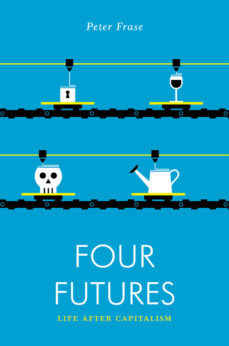
This may sound airy-fairy compared to the problems of actual landlords and property oligarchs squeezing us to death until you realize that of current corporate profits, 35 percent come from intellectual rents, be they pharmaceutical, tech, or agribusiness.
We are already well on the way to a rentist reality.
In his chapter on communism, Frase recalls Marx’s idea of the abundant society in which the division of labour is gradually abolished to make way for all-rounded individuals no longer alienated from the labor process.
He has a slight fixation on 3D printing as a kind of McGuffin device that eliminates the need to talk about the future of production and, while I remain highly skeptical about the idea that it is going to replace mass capitalist or socialist production any time soon, Frase’s point seems to be that outputs are less important on a finite planet than inputs and how to ration them.
Still, Frase’s use of Star Trek as a model of communism is less fanciful than it sounds. This is after all a thought experiment rather than a sketched-out version of 21st-century Marxist social planning. The writer is not looking for underlying laws or processes that will lead to X or Y. He’s simply asking us to think about the “decommodification of labor” — the end of capitalist wage-labor relations of production and the freeing of human potential through actual working models such as citizens’ income and a green energy revolution.
He also explores digital market models from LA’s parking system to Airbnb and Uber and, perhaps optimistically, sees possible socialist applications. This in itself makes Four Futures a refreshing, hopeful look at a future beyond the current horizon of never-ending zombie capitalism.
Which brings us to Frase’s darkest road, exterminism – a particularly extreme kind of barbarism. Given our ecological capitalist endgame, if a turn in the road towards sustainable non-growth economy is not taken, it is logical that capital will look to eliminate the excess labour force on the planet that it no longer requires.
This doesn’t end well – environmental genocide of the surplus population in a permanent war against the poor.
Four Futures: Life After Capitalism by Peter Frase (Verso, $16.95)
[Editor’s note: An essay by Frase exploring several themes from his book discussed above is available here .]
This review originally appeared in Morning Star .
- science fiction
CONTRIBUTOR

Joe Gill is a journalist and author. He writes reviews and news analysis for Morning Star , the socialist daily newspaper published in Great Britain. He is also chief subeditor at Middle East Eye .
RELATED ARTICLES

PHOTO FEATURE: 32nd National Convention of the Communist Party USA

Iranian communist leader: ‘Won’t take very long to oust theocratic government’

Daniel Jadue, the Communist mayor of Recoleta in Chile, is victim...

MOST POPULAR TODAY

EMERGENCY: To save democracy, unions say Supreme Court reform an immediate necessity

Connecticut AFL-CIO gears up to build worker power

‘We don’t want to be slaves’: Meet the People’s Liberation Army of Burma

A communist view: Let’s reject falsehoods about Dr. Martin Luther King

Lies and distractions are hallmarks of Trump’s debate performance

Official Star Trek Website Promotes Communism As Key To Real-World Realization Of Series’ Utopian Future

- Share on Gab Gab
- Share on Facebook Facebook
- Share on Twitter Twitter
- Share on Flipboard Flipboard
- Share on Reddit Reddit
- Share on News Break News Break
- Share via Email Email
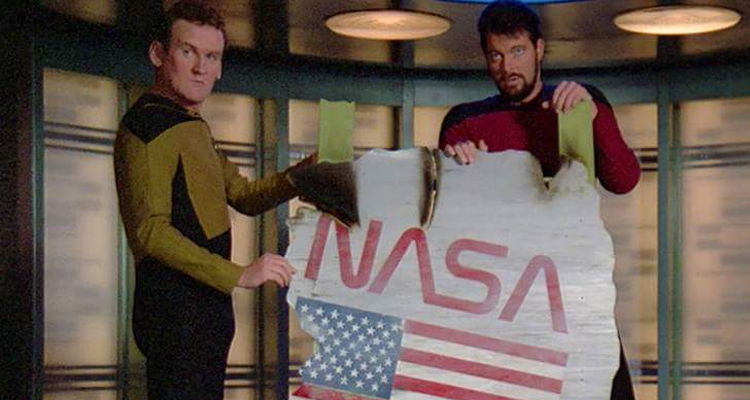
Though Communism has historically led to nothing but famine, death, and societal collapse, the official Star Trek website recently interviewed Will Nguyen, also known by the moniker ‘The Star Trek Communist’, and discussed his belief that the failed economic system is the key to achieving the utopian future presented throughout the franchise by the official Star Trek website.
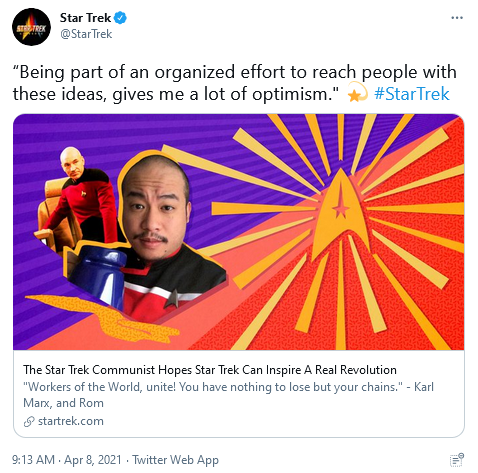
Archive Link Source: Star Trek Twitter
Related: Star Trek Announces New Film, Doesn’t Provide Any Details
In an April 9th interview published to the Star Trek website, Nguyen that the only way to “actually achieve a one-world government with no national borders, where we’ve eliminated poverty and war and hunger and disease”, as exemplified the franchise’s United Earth government.
“The conclusion is, only through a socialist revolution to overthrow capitalism, going to the next stage of human development, can you actually do that,” asserted Nguyen.
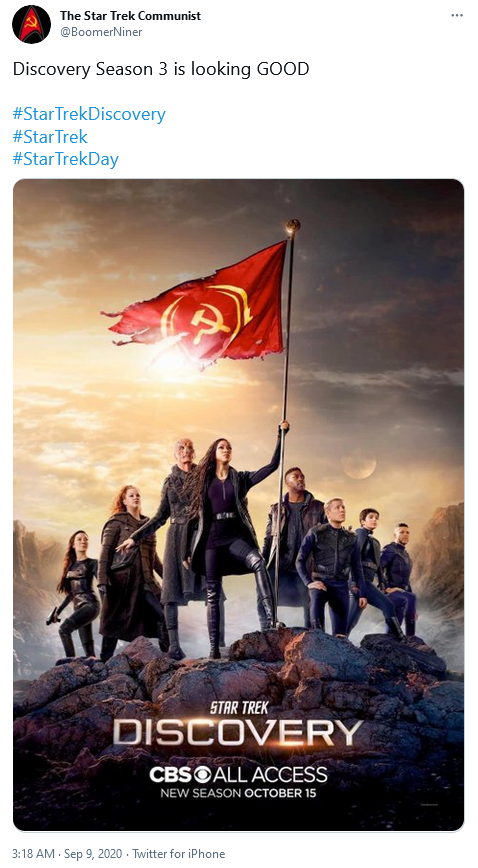
Archive Link Source: The Star Trek Communist Twitter
On the origins of his far-left ideological beliefs, Nguyen noted that he became an ardent communist after his generation, Millennials, were “affected by the crisis that is capitalism.”
“That’s obviously the Millennial generation and the Zoomers, right behind us, “said Nguyen.They were told that they just sort of go to school, and take on this debt, but then you’ll get a job. They play by the rules, right? But then they’ve emerged into a market that is virtually non-existent.”

Related: Star Trek Actor George Takei Blames Republicans For Atlanta Spa Murders
He continued, “They are swimming in debt. And then having almost all of their income go for rent, [they’ve] got to piece together multiple jobs, three or four side hustles, gig jobs…this is the best that capitalism can do. So, I think I became radicalized just by my experience, just like millions of other people, not just in this country, but around the world.”
“The reality is, we actually already live in a post-scarcity world. Now,” he further argued. “There’s often an argument that people say, ‘Oh, you only get the Star Trek future because you have a replicator box in the wall. And, you know, only then can you have socialism or communism,’ which I would say that’s a very disingenuous dodge because we already have the ability to house and clothe and care for everyone right now, that’s not that hard. The Earth has the ability to feed 10 billion people.”

At this point in the article, things get a bit bizarre, as despite having framed him as some sort of ideological pioneer, Star Trek website writer Sean Kelly admits that Nguyen’s approach to promoting his beliefs is based less on intellectual reasoning and more on throwing social media tantrums through his Twitter account (@BoomerNiner).
“His approach seems, at first glance, shallow — he doesn’t spend a lot of time debating his haters or engaging in nuanced descriptions of theory, though talking to him for even a few minutes shows that he is more than capable of doing so,” Kelly begrudgingly admits. “Instead, his pictures and memes serve as bait for those who grow enraged by his posts.”

Related: Star Trek Actor Manu Intiraymi Admits He Participated In “Systematic Racism”
Nguyen even admits to refusing to engage in debates with his critics, stating, “It’s the online culture of saying, you know, ‘change my mind,’ they want that argument. They want to have this debate, and I’ve already gone down that road a long time ago.”
He also attempted to position his tired social media antics as effective activism, telling Kelly, “It’s just actually a way to get people to ask me about socialism, Marxism, and communism. My DMs are actually open all the time, answering questions.”

Admitting that politics can be difficult to discuss with those who are “unitiated”, Nguyen tells Kelly that it’s easier to approach the subject by speaking to the character of Miles O’Brien, the prominent transporter chief and chief of operations seen across Star Trek: The Next Generation and Star Trek: Deep Space 9.
“You know, he’s very proletarian,” Nguyen argued. “His [ancestor] was Sean O’Brien, a union man and he’s a real proletarian, but he also plays cello. He plays darts. He’s a family man, with children. Has a well rounded life, while also being the heart and soul of Deep Space Nine .”
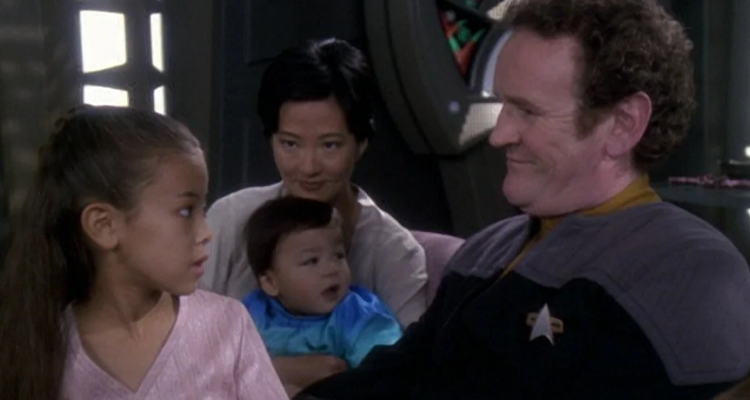
Source: Star Trek: Deep Space 9 “What You Leave Behind” (1999), Paramount Domestic Television
Related: Star Trek And Young Justice Actress Marina Sirtis Says Texans Get What They Deserve
He further added, “And that’s exactly what we’re saying … if we free ourselves from living paycheck to paycheck, what couldn’t we do? How much of our lives would be freed up? If you didn’t have to worry about putting food on the table? That’s why people gravitate toward Star Trek , they look at Star Trek , ‘Wow, I really want to live on that nice pastel-colored ship.”
In conclusion to the piece, Kelly praised Nguyen, writing that not only does he fit in “with the best traditions of Trek fandom in that he’s an optimist”.
“Being part of an organized effort to reach people with these ideas, gives me a lot of optimism. It’s what we call ‘revolutionary optimism.’ [There’s] tremendous class consciousness right now, people are learning very rapidly,” Said Nguyen, before ironically concluding, “There’s no better time to market.”.

What do you make of Star Trek’s official promotion of Nguyen and his communist ideology? Let us know your thoughts on social media or in the comments down below!
More About: Television
Read This Next

‘The Acolyte’ Showrunner Leslye Headland Teases Reylo-Style Romance Between Osha And Qimir: “I Was Sent One Fanfic And I Was Absolutely Surprised At How Prescient It Was”
By Bounding Into Comics
9 Summer Blockbusters Hitting The Big Screen in July and August 2024
By Popviewers

The Saga Of Dr Disrespect: How Fame Killed the FPS Folk Hero

12 Star Wars Behind the Scenes Images We Love
By MovieMaker Magazine

‘Cyberpunk: Edgerunners’ Showrunner Rafal Jaki’s ‘No\Name’ Becomes First Manga Plus Creator Series To Receive Official Jump+ Publication

The 12 Greatest Superhero Movies Ever Made, Ranked

Redbox Owner Chicken Soup For The Soul Entertainment Files For Chapter 11
19 Must-Watch Superhero TV Series: More Shows like Netflix’s ‘Supacell’
Unveiling the Power of Diverse Representation: ‘Supacell,’ Netflix’s Revolutionary Black Superhero Series

- Search forums
Follow along with the video below to see how to install our site as a web app on your home screen.
Note: This feature may not be available in some browsers.
- Welcome to the Trek BBS!
- General Trek Discussion
Is Star Trek Communist?
- Thread starter DeepSpace84
- Start date Nov 2, 2009
DeepSpace84
- Nov 2, 2009
I was speaking to another another person who has watched Trek before and he claimed that the future is Communist. Now, I admit there is no form of economy in the Federation, but does that it Communist? Communism is a philosophy of no hierarchy but of Social bliss, as the call it. I don't think Star Trek is Communist. If anyone read Communist history, they would know that human rights are not important, what is important is that state. The people of the Federation value human rights and diversity. Communists do not. In my opinion, the only group that resembles Communism is the Borg and they are considered a mortal enemy to humanity. What is your opinion? I don't want to create politics being so new but I want to know how all of you feel as someone brought this to my attention.
Vice Admiral
While I never really got that vibe from TOS, TNG represents a certain 'utopian communistic ideal' made possible through the miracle of replication. You also have to keep in mind that TNG did consider individual rights well below the worth of the 'group'. You wouldn't see dissent on the bridge - that would be wrong. We even see episodes where Picard is willing to allow complete genocides in the name of political directives . We also see the Federation allow many of its own citizens to die for the 'greater good' several times. It's definately a commuinist society, but one portrayed as benign and benevolent on the surface. This is very much keeping with the 'Pro-UN world peace' view presented and embraced by the Hollywood-liberals of the 1990s. It's unrealistic, and it's the main reason that TNG has dated far worse than any other part of the Trek franchise.
Fleet Admiral
DeepSpace84 said: I was speaking to another another person who has watched Trek before and he claimed that the future is Communist. Now, I admit there is no form of economy in the Federation, but does that it Communist? Communism is a philosophy of no hierarchy but of Social bliss, as the call it. I don't think Star Trek is Communist. If anyone read Communist history, they would know that human rights are not important, what is important is that state. The people of the Federation value human rights and diversity. Communists do not. In my opinion, the only group that resembles Communism is the Borg and they are considered a mortal enemy to humanity. What is your opinion? I don't want to create politics being so new but I want to know how all of you feel as someone brought this to my attention. Click to expand...
Kirkman1987
The obvious show to discuss is TNG. this element isn't too present in the other shows if at all. TNG is very liberal, no doubt. Its hard to say because of the technology. It may somewhat resemble a communist society, but it's really a post scarcity society. There's no limitation of resources, which means there's no need for capitalism, (in theory). It resembles communism, but it's really a type of system that's not possible now because of limited resources. And I disagree, individual rights were very important in TNG. Remember how Picard Treated Hugh In I, Borg.
iguana_tonante
Is that time of the month again?
24th century law recognizes concepts of intellectual property ownwership and control through the 12th Guarantee. This would not be law if the Federation was truly communist. Whatever political and economic system the Federation uses is pretty damn sweet. The Ferengi alliance is a joke and I am glad DS9 relagated them to comic relief. Daemon Bok couldn't even prevent a mutiny how does such weakness of organizational design bode for larger structures like interstellar goverments?
Kirkman1987 said: And I disagree, individual rights were very important in TNG. Remember how Picard Treated Hugh In I, Borg. Click to expand...
chakotay_lover
I am not sure what I would say, everyone is still free, they are not told how they are to run their lives in order for there to be equality for all in society, becuase there is no money it is a hard subjec, the differences in our societies is how we are regulated by the goverment and how money is treated and distrubuted differently. In the case of TNG I would say not communistic at all, I agree that the borg are the most communist, because they have equality for all. Although no human in TNG(that i remember) was in poverty, or poor, they were not all equal....I dunno its hard to concieve a world without money.
Vance said: And remember Picard's anti-religion screeds. (The Prime Directive applies in all cases, except for religion, then we can fuck the planet up all we want.) Click to expand...
Rear Admiral
Kirkman1987 said: The obvious show to discuss is TNG. this element isn't too present in the other shows if at all. TNG is very liberal, no doubt. Click to expand...
Neutral Zone
I would not say communist as there are freedoms that would never be tolerated under a communist regime. But I would say that they have the 'Ideal' soceity that has evolved and struggled for over the centuries. It's a pity that we do not have a society like that at this present time.
Vance said: It's definately Communist, in the worst sense, in all it's leanings. The difference is that it had the Hollywood trappings of the 'perfect controlled utopia' where everyone got along, all the time, and did the Right Thing (TM). It was such a rediculous fantasy that, as I said, TNG very much stands out as an accidental 1990s masterpiece of pro-UN propoganda more than science-fiction. Click to expand...
"Liberalism", as used in the United States for the past generation, is actually leftism. And most of you are missing the point. I didn't say that TNG was Stalinist, but it is certainly communist. Specifically, it's a 'communist utopia' as defined by a lot of psuedo-intellectuals that had a few too many tokes in the 1960s and came to power in Hollywood in the 1970s. It's very much that 1990s view of a perfect socially engineered ideal, the sort of thing that many 'social elites' wanted (and still want, actually) to turn the United Nations into.
Vance said: Specifically, it's a 'communist utopia' as defined by a lot of psuedo-intellectuals that had a few too many tokes in the 1960s and came to power in Hollywood in the 1970s. Click to expand...
Caped Trek Mod
- Nov 3, 2009
Vance said: "Liberalism", as used in the United States for the past generation, is actually leftism. And most of you are missing the point. I didn't say that TNG was Stalinist, but it is certainly communist. Specifically, it's a 'communist utopia' as defined by a lot of psuedo-intellectuals that had a few too many tokes in the 1960s and came to power in Hollywood in the 1970s. Click to expand...
It's very much that 1990s view of a perfect socially engineered ideal, the sort of thing that many 'social elites' wanted (and still want, actually) to turn the United Nations into. Click to expand...
Ward Fowler
Kirkman1987 said: It may somewhat resemble a communist society, but it's really a post scarcity society. There's no limitation of resources, which means there's no need for capitalism, (in theory). It resembles communism, but it's really a type of system that's not possible now because of limited resources. Click to expand...
Sounds like Vance has an axe to grind. There may be leftist leanings in the depiction of the Federation and Starfleet, but I can also see libertarian and even conservative leanings in some of its stances. The Prime Directive is akin to libertarian ideas of staying out of others' affairs, similar to Ron Paul's avowed opposition to the U.S. intervening abroad. And Starfleet, as an older institution bound by tradition, certainly has conservative leanings. I see the Federation as a post-socialist, post-capitalist society that we as 21st century folks can't classify, the same way a medieval peasant would be unable to picture a society that wasn't governed by the feudal model of divine right of kings. I agree with Ward Fowler and Kirkman1987 -- the Federation is a post-scarcity society, to be sure, due partly to replicator technology. -- RR
Red Ranger, it's not really an axe to grind. As I said, the overwhelming majority of Trek never shows this communist hyper-utopia. It ONLY really exists in the first two seasons of TNG, and that was a direct result of Gene Roddenberry himself. If people WANT to see Star Trek in a 'communist manifesto' light, it's very easy to point to those two years. Outside of that, I really don't see Trek going far off the typical national mood, or at least the 'safe' zone that Hollywood distills for television. So, a little to the right at times, a little to the left. For me, personally, TOS (with the approach of tackling a problem with three points of view all the time) really struck the best balance overall.
Fleet Captain
I see Star Trek as more "Idealist" than political. Of course that doesn't stop those of a liberal persuasion from hijacking it as their own... But I think that's the appeal of Star Trek -- we all have to one degree or another an idealistic streak (and that regardless of political affiliation, BTW). I think we'd all like to live in a world like Roddenberry's 23rd and beyond centuries...
Similar threads
- Moviefan2k4
- Apr 15, 2024
- Ferengi Prime 5
- Sep 28, 2023
- May 14, 2024
- Jun 12, 2024
- Star Trek: Deep Space Nine
- Jun 20, 2024
Sign up / Register
- Star Trek: Enterprise
- Star Trek - The Original & Animated Series
- Star Trek: The Next Generation
- Star Trek: Voyager
- Star Trek: Discovery
- Star Trek: Picard
- Star Trek: Strange New Worlds
- Star Trek: Lower Decks
- Star Trek: Prodigy
- Star Trek Movies I-X
- Star Trek Movies: Kelvin Universe
- Future of Trek
- Trek Gaming
- Trek Literature
- Fan Fiction
- Fan Productions
- CSI (at Talk CSI)
- Science and Technology
- Sports and Fitness
- Web Sites/Design
- Miscellaneous
- Site Forums
Peter Thiel Thinks ‘Star Trek’ Is ‘Communist’ While ‘Star Wars’ Is ‘Capitalist’
Billionaire also tells New York Times that Meryl Streep is overrated and that “no corruption can be a bad thing”

In a wide-ranging interview with the New York Times’ Maureen Dowd on Wednesday, billionaire tech giant Peter Thiel defended his support of President-Elect Donald Trump and offered some characteristically esoteric opinions on everything from Meryl Streep to “Star Wars.”
To a question noting that “President Obama had eight years without any ethical shadiness,” Thiel replied, “But there’s a point where no corruption can be a bad thing. It can mean that things are too boring.”
And in a rapid-fire sidebar , he also agreed with the president-elect that Meryl Streep is “probably very overrated, especially by all the people who are vociferously saying that she’s overrated.”
And he stated a clear preference for “Star Wars” over “Star Trek” in a way that generated much comment on social media.
“I’m a capitalist. ‘Star Wars’ is the capitalist show. ‘Star Trek’ is the communist one,” he told Dowd.
“There is no money in ‘Star Trek’ because you just have the transporter machine that can make anything you need,” he added. “The whole plot of ‘Star’Wars” starts with Han Solo having this debt that he owes and so the plot in ‘Star Wars’ is driven by money.”
The rationale for Thiel’s preference for “Star Wars” sparked an immediate online response, particularly from those who concluded that Jabba the Hutt — the guy to whom Han Solo owed that debt — would emerge in his thinking as one of the franchise’s heroes.
https://twitter.com/squarelyrooted/status/819382301117349888
Peter Thiel's model for an ideal capitalist system is Jabba the Hutt pic.twitter.com/pw0nunak8O — flglmn (@flglmn) January 12, 2017
peter thiel, angrily fast-forwarding past the part where leia throttles jabba with his own chain — flglmn (@flglmn) January 12, 2017
This is AMAZING bc it means Peter Thiel thinks the ultimate hero in STAR WARS is Jabba the Hutt, who has given Han motivation for success. pic.twitter.com/D03rcDsrOa — Anthony Oliveira (@meakoopa) January 12, 2017
Someone tell Peter Thiel about the Ferengi. — Jay, in electronics | ✊ (@xeromachine) January 12, 2017
Memory Beta, non-canon Star Trek Wiki
A friendly reminder regarding spoilers ! At present the expanded Trek universe is in a period of major upheaval with the continuations of Discovery and Prodigy , the advent of new eras in gaming with the Star Trek Adventures RPG , Star Trek: Infinite and Star Trek Online , as well as other post-57th Anniversary publications such as the ongoing IDW Star Trek comic and spin-off Star Trek: Defiant . Therefore, please be courteous to other users who may not be aware of current developments by using the {{ spoiler }}, {{ spoilers }} OR {{ majorspoiler }} tags when adding new information from sources less than six months old (even if it is minor info). Also, please do not include details in the summary bar when editing pages and do not anticipate making additions relating to sources not yet in release. THANK YOU
- Memory Beta articles sourced from comics
Communism was a political ideal that means the well-being for all.
This ideal was embraced by a number of nation states on Earth during the 20th and 21st centuries , these nations states weren't really communist at all, ranging from Marxists to authoritarian socialists. The most notable of those were the Soviet Union and People's Republic of China .
Marxism was a political ideology founded by Karl Marx, which purported to create an economic system of enforced equality for all people, via extensive governmental oversight of national economies. The ideas of Marxism were eventually used to herald an authoritarian ideology in the states where it was implemented. During the latter half of the 20th century, the competition between free-market capitalism and communism constituted the Cold War .
In the United States of America and a number of other nations, pejorative slang terms came into popular use for people who were proponents of communism, which included "pinko", "red" and "commie." When Captain Benjamin Sisko was experiencing visions sent by the Prophets , the character of Douglas Pabst had insinuated that Herbert Rossoff was a proponent of communism. ( DS9 episode & novelization : Far Beyond the Stars ) Similarly, Professor Eugene Eckhart accused Gary Seven of being a communist, along with all opponents of the Vietnam War . ( TOS - Star Trek: Assignment: Earth comic : " My Name Is Legion ")
By the late 20th century, the shortcomings of Soviet style communism became apparent - the country was suffering economic hardship brought on by extensive military spending and inefficiencies of central economic planning. Soviet leader Mikhail Gorbachev began a program of perestroika , or "restructuring," to liberalize the Soviet Union - which was to include the elimination of corruption, simplification of bureaucracy, and production improvements. Hardliners in the Soviet government attempted to roll back the reforms by staging an attempted coup in late 1991, which failed within a few days when the leaders of the coup were unable to consolidate power. After the coup was defeated, many of the Soviet Union's constituent members began to assert their independence, and the Soviet Union was dissolved on 25 December 1991 . ( TOS novel : Probe )
At the least, some of the ideals of communism survived in Russia into the 23rd century. When the senior staff of the late starship USS Enterprise traveled back in time to 1986 , Pavel Chekov explained to Admiral Kirk that they would not have needed money if they landed in Russia . Several bystanders overheard Chekov apparently praising communism, leading one bystander to mutter that Chekov was a "...pinko commie exchange student." At this point, Kirk cautioned Chekov to not antagonize the Americans of the time by praising communism in their presence. ( TOS novelization : Star Trek IV: The Voyage Home )
External links
- Communism article at Memory Alpha , the wiki for canon Star Trek .
- Communism article at Wikipedia , the free encyclopedia.
- 1 Lamarr class
- 2 USS Voyager (NCC-74656-A)
- 3 Federation starship registries
Screen Rant
Star trek debuts its awe-inspiring council of the gods, confirming members from across franchise history.

Your changes have been saved
Email Is sent
Please verify your email address.
You’ve reached your account maximum for followed topics.
Star Trek Confirms the Jaw-Dropping Final Fate of Doctor M'Benga's Daughter
Star trek actor compares working with william shatner & patrick stewart, every star trek ship with an illegal cloaking device.
- Star Trek's Council of the Gods is unveiled in Star Trek #21, composed of beings from across the franchise's history.
- The Council of the Gods meets to discuss matters of universal importance.
- The Pleroma and the Council may not be as safe as they think, with both Kahless and Lore still on the loose.
Warning: contains spoilers for Star Trek #21!
For months, Star Trek has dropped tantalizing hints about the Pleroma, and now it stands revealed in all its glory, and is composed of members from across the franchise’s 58-year history. In Star Trek #21, Captain Sisko and the Theseus enter the Pleroma, and are greeted with an awe-inspiring sight: gods from across the franchise, gathered to decide on matters of universal importance.
Star Trek #21 is written by Jackson Lanzing and Collin Kelly and drawn by Megan Levens. Sisko and his senior officers are brought before the gods in the Pleroma, who have gathered to debate on the Organian issue. A text piece, made to resemble a Starfleet briefing, lists each of the gods on the council. Among those present are Trelane, Apollo, Charlie Evans and the Metrons, from the original Star Trek, as well as Kevin Uxbridge from Star Trek: The Next Generation.
The Caretaker, who kicked off Star Trek:Voyager, is also among the gods.
Star Trek's Gods Are Facing a Threat Unlike Any Other
The council of gods is a historic development in the star trek universe.
In late 2022, IDW relaunched their line of Star Trek comics, creating a massive, franchise-spanning “god war.” The Klingon Emperor Kahless launched a campaign against the gods, slaughtering them with a powerful weapon. Captains Sisko and Worf were able to stop Kahless’ plans for the time being, but the damage had been done. Sisko and the crew of the Theseus traveled to the Pleroma to help fix the damage, but found themselves faced with a chilly reception. T’Lir, who was revealed to be the last of the god-like Organians, was seeking the restoration of his powers.
The introduction of the Pleroma may rank as one of the most important developments in the Star Trek franchise. In the various shows and movies, the crew often encounter god-like beings, and this stretches back to the franchise’s first days. The Pleroma gives these beings new depth, showing that they are, in many ways, just another race in the Star Trek universe. The gods of the universe have their own laws and governance, much like the Federation. However, the gods are obviously working on a far greater scale, meeting to decide the fates of entire species.
The Pleroma May Not Be the Safe Haven It Appears to Be
Will kahless or lore find the pleroma.
Yet, as Star Trek’s god war has shown, these beings can be killed. Both Kahless and Lore are still on the loose, and the Pleroma would make a highly desirable target for them. Furthermore, Section 31 gave Lily Sato a mysterious device to be used at a later date, perhaps suggesting the shady agency has an interest in the Pleroma. The gods of the Pleroma proceed as if they are invulnerable and infallible, but Kahless has thrown all of this into doubt. Despite its great power and elusive nature, the Pleroma may soon be under siege.
Star Trek #21 is on sale now from IDW Publishing!

IMAGES
VIDEO
COMMENTS
Now, about post-scarcity. Capitalism, communism and socialism are all economic systems based in scarcity: they are all approaches to address the issue of how to distribute limited resources to a population. But the world of Star Trek eliminates the need for a lot of the discussion of how to do things.
That's because the federation and human society are not socialist. There is a higher standard of living that is the result of technological breakthroughs that eliminated hunger and poverty. Buildings can be made with replicators, and rocks can be converted into food. There are things in the Star Trek universe that are scarce because a ...
The idea that being a Starfleet member is one of the most (if not the most) prestigious and aspirational callings in this society, and the overwhelming influence Starfleet seems to wield in military and civilian matters, could find a parallel in Communist Party membership in a Communist state. Though Starfleet, on the surface at least, is sure ...
Star Trek: The Original Series aired between 1966 and 1969 — a fertile period for the political imagination in spite of great unrest. ... Majel Barrett, he identified as a communist. But we know from the many accounts of his unethical business practices that he was also obsessed with making money. He preached peace and love but was infamously ...
The plot of "Star Trek" closely followed J. Posadas's essay proposing solidarity between the working class and the alien visitors. ... wrote "Red Star," a utopian novel about a Communist ...
I find your 'answer' sickening bigotry and offencive and represents everything Star Trek is not. First of all it is factually incorrect for example you take the racist idea 'the Romulans were the Chinese' Gene based them on Mao's currupt interpretation and realisation of communist China - a political movement not the Chinise as a people.
Trekonomics: The Economics of Star Trek is a 2016 book by French economist Manu Saadia.The book deals with the topic of the scarcity in the economy by looking at it in reverse. The author describes the 24th-century Star Trek universe in which scarcity does not exist at all. The book explores a post-scarcity age and how our society would need to change to adapt itself to such an environment.
Communism in Star Trek [duplicate] Ask Question Asked 8 years, 3 months ago. Modified 8 years, 3 months ago. Viewed 967 times ... In the universe of Star Trek, there's said to be no use of money in the Federation (at least, not in Starfleet). They talk a lot about it in TNG; I don't want to get side-trekked into debating the best label for ...
Individualism, Not Socialism. Star Trek sometimes catches flack for portraying a Socialist space utopia. There's a vast, far-reaching central government, and Captain Picard often waxes - especially when time travel gives him the opportunity to lecture present-day people - about how humanity has evolved beyond self interest.
It in fact seems as though the Federation is a military dictatorship run by Starfleet. The structure is actually very bourgeois democratic, essentially modeled after the United States federal system- at least based on what I gleaned from Memory Alpha. Not communist, they still have a class system and a state.
The Star Trek utopia will free us from the fetters of the dismal science. The economics of Star Trek is thus True Communism. Fortunately, without the intervening bit of socialism that anyone has ...
Star Trek was unable to provide a venue, even in a fictional universe, in which these contradictory positions could co-exist. Keywords: Star Trek; ... the character never referred to Soviet communism, other than in one passing and now-dated reference to "Leningrad.") 20. Star Trek, "Plato's Stepchildren," episode no. 65, ...
Still, Frase's use of Star Trek as a model of communism is less fanciful than it sounds. This is after all a thought experiment rather than a sketched-out version of 21st-century Marxist social ...
Source: Star Trek: The Next Generation "The Royale" (1989), Paramount Domestic Television. Though Communism has historically led to nothing but famine, death, and societal collapse, the official Star Trek website recently interviewed Will Nguyen, also known by the moniker 'The Star Trek Communist', and discussed his belief that the failed economic system is the key to achieving the utopian ...
The Economics of Star Trek. Written: 2000.03.04 Last revised: 2000.07.10 Objective The primary goal of this document is to show that the writers and producers of Star Trek are promoting the values and ideals of communism. I should note that this has not always been the case; the TOS Federation was clearly a free market, and I can only imagine ...
Even communism is about fair distribution whereas Star Trek's Earth is beyond distribution and has long reached "don't give a fuck, I got whatever I want"-status. It's pretty clear it's a democratic republic though, with a president and elections that obviously resemble the US, but without the environmental pollution, the gun nuts, the ...
Communism is a philosophy of no hierarchy but of Social bliss, as the call it. I don't think Star Trek is Communist. If anyone read Communist history, they would know that human rights are not important, what is important is that state. The people of the Federation value human rights and diversity.
'Star Trek' is the communist one," he told Dowd. "There is no money in 'Star Trek' because you just have the transporter machine that can make anything you need," he added. "The ...
Communism was a political ideal that means the well-being for all. This ideal was embraced by a number of nation states on Earth during the 20th and 21st centuries, these nations states weren't really communist at all, ranging from Marxists to authoritarian socialists. ... the advent of new eras in gaming with the Star Trek Adventures RPG, Star ...
Star Trek is late-stage Socialism if not Communism. The Federation still exists in Star Trek, but the Federation is not a "state" as in, the Federation is an organization based around simply management of society, it doesn't have an army, it doesn't have a police force, dedicated to the protection of private property and economic hierarchical ...
Communism is expressed in Star Trek by the Borg. The ultimate collective, the perfect antfarm society. Resistance is inevitable. Nov 26, 2003 #20 Njorl. Science Advisor. 288 19. The Star Trek economic system most closely resembles utopian socialism. Communism is a very specific form of socialism. When economists speak of communism, marxism and ...
It seems to be some weird combination of communism and capitalism. They say they don't have money but people still own property (the Picard's have their vineyard, the Sisko's the restaurant, etc). ... However, after First Contact in the Star Trek universe, with the aid of the Vulcans, Humans are able to create seemingly unlimited resources that ...
Warning: contains spoilers for Star Trek #21!. For months, Star Trek has dropped tantalizing hints about the Pleroma, and now it stands revealed in all its glory, and is composed of members from across the franchise's 58-year history. In Star Trek #21, Captain Sisko and the Theseus enter the Pleroma, and are greeted with an awe-inspiring sight: gods from across the franchise, gathered to ...
In Star Trek the replicators and moneyless economy mean that the average standard of living is much higher than ours today, and socially they've done away with some of the problems common today but that doesn't make it "utopian". For example, modern English society would seem utopian to a 12th century English peasant - but it isn't utopian, it ...